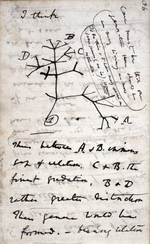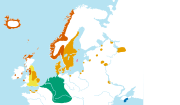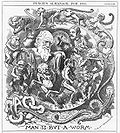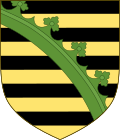Common descent is a concept in evolutionary biology applicable when one species is the ancestor of two or more species later in time. According to modern...
30 KB (3,067 words) - 17:47, 26 October 2024
Evidence of common descent of living organisms has been discovered by scientists researching in a variety of disciplines over many decades, demonstrating...
245 KB (27,658 words) - 17:28, 17 October 2024
Look up descent in Wiktionary, the free dictionary. Descent may refer to: Common descent, concept in evolutionary biology Kinship, one of the major concepts...
4 KB (468 words) - 09:56, 6 August 2024
Kinship (redirect from Kinship and Descent)
patrilineal descent is considered most significant differs from culture to culture. A clan is generally a descent group claiming common descent from an apical...
67 KB (8,467 words) - 23:52, 18 October 2024
Unilineality (redirect from Unilineal descent)
demonstrate their common descent from a known apical ancestor. It is also called the simple unilineal descent. Recent research on the unilineal descent organization...
2 KB (236 words) - 09:10, 17 November 2023
the term for them did not yet exist. He listed a number of them in The Descent of Man, including the muscles of the ear, wisdom teeth, the appendix, the...
32 KB (3,876 words) - 05:01, 7 May 2024
Monogenism (redirect from Common descent of humans)
sometimes monogenesis is the theory of human origins which posits a common descent for all humans. The negation of monogenism is polygenism. This issue...
12 KB (1,420 words) - 21:58, 12 November 2024
Evolution (redirect from Descent with modification)
limited set of common morphologies, their fossils do not provide information on their ancestry. More recently, evidence for common descent has come from...
240 KB (24,900 words) - 03:29, 23 November 2024
The Descent of Man, and Selection in Relation to Sex is a book by English naturalist Charles Darwin, first published in 1871, which applies evolutionary...
51 KB (6,425 words) - 19:38, 29 July 2024
ætt/ätt (pronounced [ˈæːtː] in Old Norse) was a social group based on common descent, equivalent to a clan. In the absence of a police force, the clan was...
3 KB (323 words) - 07:18, 28 August 2024
teach it as fact. Christian fundamentalists reject the evidence of common descent of humans and other animals as demonstrated in modern paleontology,...
164 KB (18,516 words) - 16:09, 22 November 2024
book presented a body of evidence that the diversity of life arose by common descent through a branching pattern of evolution. Darwin included evidence that...
165 KB (18,861 words) - 23:26, 24 November 2024
Saxe-Coburg-Saalfeld, last common descent from Francis Josias, Duke of Saxe-Coburg-Saalfeld, further divided into: Saxe-Coburg-Gotha, last common descent from Francis...
35 KB (2,711 words) - 06:32, 31 October 2024
Untersuchungen über die Bedeutung der Deszendenztheorie für die Psychologie (section Common descent and psychology)
Psychologie (English: Examinations of the Implications of the Theory of Common Descent for Psychology) is a book written by German psychologist, pedagogist...
43 KB (5,421 words) - 06:08, 29 August 2024
Intestacy (redirect from Descent and distribution)
a will. In most contemporary common-law jurisdictions, the law of intestacy is patterned after the common law of descent. Property goes first or in major...
13 KB (1,668 words) - 06:43, 26 October 2024
skeletons of birds and humans. Comparative anatomy has provided evidence of common descent, and has assisted in the classification of animals. The first specifically...
12 KB (1,243 words) - 23:58, 2 October 2024
Farias, Farias (2020). From FUCA To LUCA: A Theoretical Analysis on the Common Descent of Gene Families. doi:10.31080/ASMI.2020.03.0494 (inactive 1 November...
15 KB (1,769 words) - 07:14, 2 November 2024
1809. Charles Darwin more famously proposed the theory of universal common descent through an evolutionary process in his book On the Origin of Species...
61 KB (6,394 words) - 08:43, 23 November 2024
genealogy. The time to the genealogical MRCA (most recent common ancestor by any line of descent) of all living humans cannot be traced genetically because...
23 KB (2,893 words) - 16:02, 5 November 2024
biology that studies the evolutionary processes (natural selection, common descent, speciation) that produced the diversity of life on Earth. It is also...
31 KB (3,423 words) - 11:50, 11 September 2024
now generally agreed that even the Altaic languages do not share a common descent: the similarities between Turkic, Mongolic and Tungusic are better explained...
31 KB (3,674 words) - 11:26, 9 August 2024
Bird of prey (section Common names)
mousebird relatives (Sandcoleidae), and Messelasturidae indicating possible common descent. Some Enantiornithes also had such talons, indicating possible convergent...
48 KB (5,038 words) - 09:15, 25 November 2024
Tree of life (biology) (redirect from Tree of descent)
believed in the transmutation of life forms, but he did not believe in common descent; instead he believed that life developed in parallel lineages (repeated...
32 KB (3,591 words) - 00:59, 28 August 2024
current processes, from imperfections in organisms recording historical common descent, and from transitions in the fossil record. Theories of evolution provide...
45 KB (5,249 words) - 22:09, 17 October 2024
appeared that a classification should reflect the Darwinian principle of common descent. Tree of life representations became popular in scientific works, with...
69 KB (6,803 words) - 00:22, 21 October 2024
is that humans inherited the muscle through common descent, and numerous animals that humans share a common ancestor with (such as the orangutan) still...
12 KB (1,342 words) - 07:58, 1 October 2024
categories and living forms as malleable—even suggesting the possibility of common descent. Serious evolutionary thinking originated with the works of Jean-Baptiste...
133 KB (13,837 words) - 17:58, 9 November 2024
united by actual or perceived kinship and descent. Even if lineage details are unknown, a clan may claim descent from a founding member or apical ancestor...
11 KB (916 words) - 01:03, 17 November 2024
shown that Sarcodina is not a monophyletic group whose members share common descent. Consequently, amoeboid organisms are no longer classified together...
51 KB (4,923 words) - 03:15, 16 November 2024
Darwinism but accepted a limited form of evolution. He advocated a form common descent of "some groups of very similar species, which also inhabit a limited...
3 KB (287 words) - 06:26, 17 September 2024




















